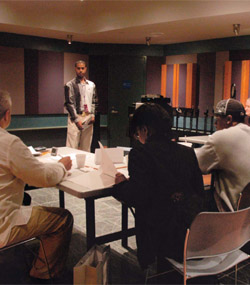music education
The Next Diddy?
Clive davis department is creating industry dynamos
by Renée Alfuso / CAS '06
While many critics bemoaned the late 1990s reign of Britney Spears, 'N Sync, and Backstreet Boys as a sign of a musical apocalypse, the period was truly a golden era—at least financially. Teen fans consumed endless merchandise, packed concert arenas, and helped to spike the combined sales of the top three albums to more than 29 million copies in 1999. But fast-forward to the present—past the emergence of inexpensive recording equipment, Napster, iTunes, MySpace, and streaming mobile-phone music—where the top three albums had combined sales of only about 10 million CDs in 2006. The tech revolution has irrevocably altered how music is created, engineered, marketed, and distributed, and has democratized the industry so much that it now favors those skilled in all facets. Rather than relying on talent alone, artists are best served acting as triple threats—akin to rolling Elvis, the Colonel, and Sam Phillips into one.
 GRADUATING STUDENTS FACED THE MUSIC — AMERICAN IDOL STYLE — BY PERFORMING
BEFORE A PANEL OF INDUSTRY VETERANS LAST MAY.
GRADUATING STUDENTS FACED THE MUSIC — AMERICAN IDOL STYLE — BY PERFORMING
BEFORE A PANEL OF INDUSTRY VETERANS LAST MAY.
Responding to this evolution, the Clive Davis Department of Recorded Music in the Tisch School of the Arts, which graduated its first class in spring 2007, is one of a few programs training all students as musicians, technicians, and entrepreneurs. Undergrads might pursue courses in commercial branding, ear training, sound mixing, and publicity all in the same semester. "The shift had already occurred in the industry, but not in [most] educational institutions," says department chair Jim Anderson. "Because we started in 2003, we've been able to keep up."
Named for legendary music-business CEO Clive Davis (WSC '53), who helped steer Whitney Houston, Billy Joel, Bruce Springsteen, and Alicia Keys to stardom, the program regularly entertains key industry figures who offer real world advice—and, in some cases, harsh criticism. Graduating seniors in May 2007 presented Capstone Projects—the culmination of their creative, technical, and business ventures, ranging from album debuts to plans for an innovative nightclub in Croatia—before a panel of major-label executives.
Among the judges was Debbie Southwood-Smith, who has worked in the business for 20 years, most recently as VP of A&R at Interscope Records, and believes resolving issues such as slumping sales and rampant illegal downloading is best left to this next generation of industry players, who have grown up with the technology that has rewritten music-business rules. "I don't think it's the adults who are going to figure out these problems," Southwood-Smith says. "I think it's going to be a bunch of 20-year-olds who solve it."
Here's a look at three students who presented Capstone Projects last May. Keep an eye out for them on MTV or at the Grammy Awards—or check out their Web sites today.
The Songstress
JENNIFER NEWMAN, AGE 23
 Multitasking: Jennifer Newman
spent more than 300 hours in the
studio working on her first full-length
indie pop album, on which
she wrote, produced, engineered,
and played piano and guitar. "I've
always been interested in all the
different sides of music, so I never
really wanted to
be just a singer,"
she says.
Multitasking: Jennifer Newman
spent more than 300 hours in the
studio working on her first full-length
indie pop album, on which
she wrote, produced, engineered,
and played piano and guitar. "I've
always been interested in all the
different sides of music, so I never
really wanted to
be just a singer,"
she says.
Musical influences: She grew up listening to jazz vocalists, such as Ella Fitzgerald, and loves singer-songwriter Regina Spektor. But she also listened to a lot of hard rock in high school and still ranks Tool as her favorite band.
Web waves: Her album was released on iTunes and Amazon.com, among other sites, this past summer, and she's pitching her songs out to more than 500 music blogs. She already has more than 19,000 hits on her MySpace Web page.
On her own: Newman has more than 20 musicians in her family—including her Grammy-winning cousin Randy Newman— and her grandfather was president of Fox Music. "I've always tried to do things on my own," she says. "And then, when I'm ready, I can reach out to them."
Hear her music: www.jennifernewman.net
The Producer
EVAN MOORE, AGE 22
 Upstart: Evan Moore runs his production
company Thunder, Lightning
& Lightning in the cramped,
subterranean Lower East Side
recording studio that he and his
partners once used for their band's
rehearsals—until they realized
they enjoyed being in the studio
more than touring."We're a rock
band that records other rock
bands," he says. Since they started
in 2005, they've already produced
four full-length albums, in addition
to audio work for commercials
and films, and are constantly
searching MySpace and local
shows for new talent.
Upstart: Evan Moore runs his production
company Thunder, Lightning
& Lightning in the cramped,
subterranean Lower East Side
recording studio that he and his
partners once used for their band's
rehearsals—until they realized
they enjoyed being in the studio
more than touring."We're a rock
band that records other rock
bands," he says. Since they started
in 2005, they've already produced
four full-length albums, in addition
to audio work for commercials
and films, and are constantly
searching MySpace and local
shows for new talent.
Working it: Moore and company produced a series of online commercials featuring live rock performances for Garnier Fructis.The shampoo company loved them so much that they ordered four times as many ads, which keeps Moore busy filming every two months in Miami. "We use commercial work to support us so we can keep doing the more creative stuff," he says.
His vision: Moore wanted to create a different kind of production company because he was "fed up with studios where producers were really just glorified engineers charging bands exorbitant hourly rates." Instead he charges a set premium and considers bands equal partners in the recording process.
Winning taste: Two of Moore's bands recently won first and second place in the John Lennon Songwriting Contest.
The Rock Star
TOM SCHECTER, AGE 22
 The pitch: Tom Schecter
is the front man and bass player for
the hard rock power trio called
Dibble Edge, which, according to
the band's Web site, sounds like
"the musical equivalent of slamming
a bottle of
whisky." He
originally
formed the
band as a senior
in high school
and recently
started the label
Freak City
Records to
record their
first album,
which he
also wrote and produced.
The pitch: Tom Schecter
is the front man and bass player for
the hard rock power trio called
Dibble Edge, which, according to
the band's Web site, sounds like
"the musical equivalent of slamming
a bottle of
whisky." He
originally
formed the
band as a senior
in high school
and recently
started the label
Freak City
Records to
record their
first album,
which he
also wrote and produced.
Musical influences: Alice in Chains, Guns n' Roses, Soundgarden.
Album highlight: The band recorded their first single, "New Generation," with legendary engineer-producer Eddie Kramer, who's worked with Led Zeppelin, Jimi Hendrix, and The Beatles, after he selected their audition tape during a visit to NYU. "He's been the man for 40 years, so having his name attached to anything is a huge deal," Schecter says.
Serious drive: Though currently working as a paralegal in New York to pay the bills, Schecter is moving full steam ahead with his new album: "We're gonna play the hell out of any place that will take us, and we're gonna sell the hell out of this thing online."
Hear their music: www.myspace.com/dibbleedge
Photo © Frank Celenza; JENNIFER NEWMAN PHOTO BY GARY HE; TOM SCHECTER PHOTO © ALANA CUNDY
Rather than relying on talent alone, artists are best served acting as triple threats—akin to rolling Elvis, the Colonel, and Sam Phillips into one.







